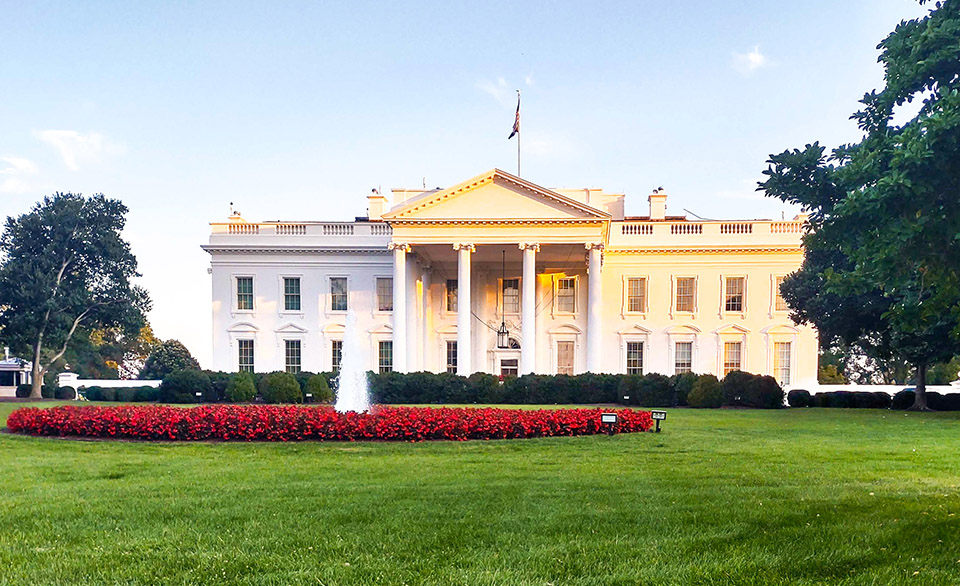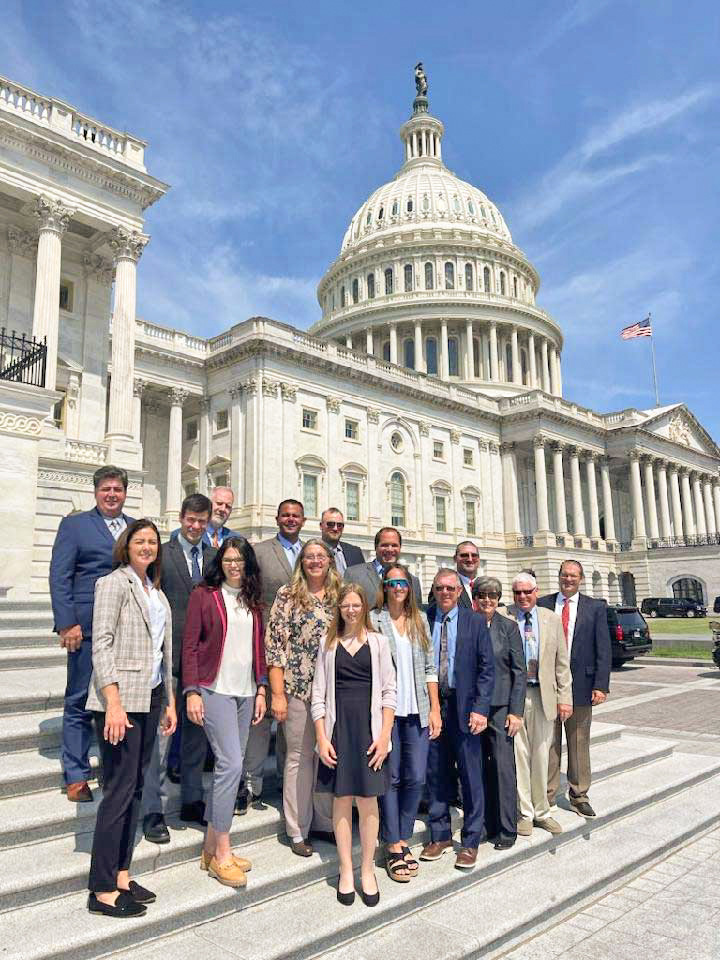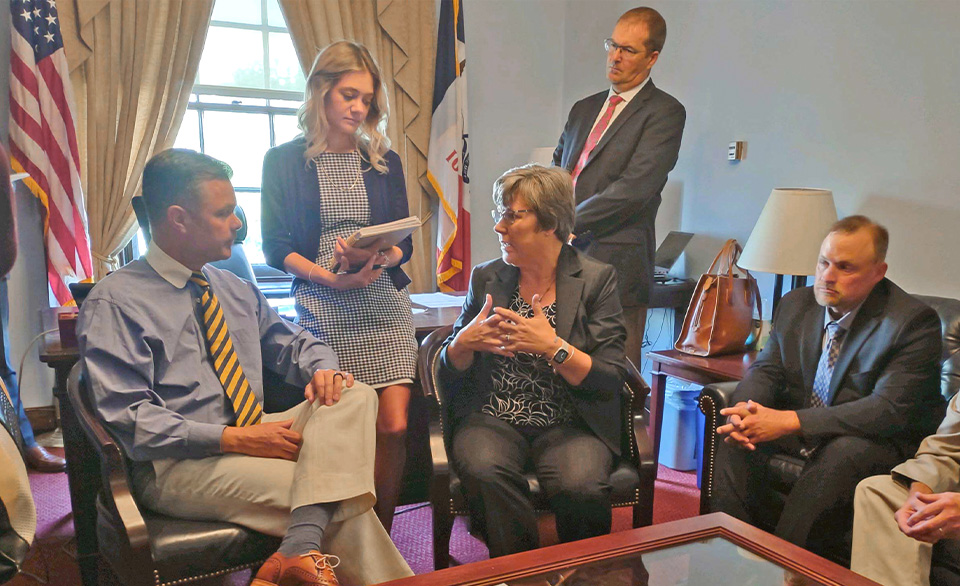
(Photo: Iowa Soybean Association / Jeff Hutton)
Soy priorities on capitol hill
September 1, 2023
Influencing change is a collaborative effort, and Iowa Soybean Association (ISA) board members and farmers with the Iowa-Missouri Policy Leaders Fellowship (PLF), stood together as they educated legislators on issues impacting soybean farmers ahead of the 2023 Farm Bill.
In July, nearly 25 Iowa soybean farmers traveled to Washington, D.C., to speak with Iowa’s congressional delegation and others about the bill’s future, which directly impacts trade, farming programs, crop insurance, checkoff program governance and much more.
Timing was critical as Congress continued to grapple with an expiring farm bill amidst countless new legislative proposals, existing policy tweaks and limited budget resources.
On the hill
During the visit to D.C., ISA members met with all six members and/or the staffs of Iowa’s Congressional delegation.
“While canvassing the Hill, Iowa farmers delivered key messages related to an on-time, meaningful and fully funded farm bill, increased investment in innovation and competitiveness research, additional biobased market opportunities and soy utilization and the nearly $12.34 return on investment for every dollar invested through the soy checkoff,” says ISA Senior Director of Public Affairs Michael Dolch.
ISA board members emphasized the importance of passing the farm bill in a timely manner.
“We’d like to see it passed before the end of the year,” says ISA District 6 Director Dave Walton from Wilton. “We’re trying to protect the farm safety net; crop insurance is vital to us and keeps us in the game.”
Fellow ISA District 9 Director Pat Swanson of Ottumwa echoed Walton’s concerns and told legislators that the bill is critical in determining the future of the country’s agricultural sector.
She says the further along the farm bill is pushed or extended into the future, that uncertainty will be even more concerning for young farmers, bankers and others who need to know what’s going on with programming, trade and markets.
Swanson says the farm bill should be labeled as the “Food Bill.”
“We’re producing the food,” says Swanson, who also co-owns a crop insurance agency. “Food security is national security — that should be the focus.”
Iowa Third District Rep. Zach Nunn says he’s cautiously optimistic that the farm bill will feature many of the priorities soybean producers addressed. He suggested a framework could be agreed upon by the end of the year.
Getting the farm bill ready for passage in 2023 will be successful if ISA and other stakeholders share information with Congressional leadership and others, Nunn says.
“We need your help in doing that,” he says. “I’m asking for your practical frontline experience, so I can be your voice.”

Program wrap-up
The four days in Washington, D.C., was the culmination of a year-long program, PLF, aimed to inform soybean farmers of the legislative and regulatory process.
“Over the past year, these young men and women rose to the challenge, studied the role of government and the legislative process, and gained a better understanding of the policy and regulatory issues impacting U.S. soybean farmers,” says Dolch, who leads the program.
While in D.C., program participants attended the American Soybean Association’s summer board meeting, providing a unique opportunity to interact directly with a key North American trading partner, congressional members, and staff.
“The PLF is a constant reminder of how education and engagement can help move an industry forward,” Dolch says.
PLF member Marilee Jones of Sheffield says the opportunity to travel to Washington, D.C. was invaluable.
“It was a great experience to see the process of policy from the local to the national levels,” says Jones. “As farmers, we need to keep in touch with our elected officials and make sure our voices are heard and that they realize how laws impact our farms, families, and future.”

Support sought
PLF participants witnessed discussion that reaffirmed key priorities for soy growers.
They continued their conversation with Sen. Joni Ernst.
Swanson, the ISA director and crop insurance agent, told Sen. Ernst that Iowa farmers are simply asking for support of their livelihoods.
“We’re just trying to do what we’ve done for generations,” she says. “Help us do that and stay profitable.”
Ernst says she supports checkoff programs and doesn’t anticipate much pushback on the program or crop insurance as it relates to this year’s farm bill.
However, she noted that trade was not a focus of the Biden administration, despite the current ag trade deficit.
“This will be the first time in the past 50-60 years that we have this large of a trade deficit in the agricultural sector,” Ernst says. “We should never be in this situation. We have the greatest producers in the world.”
The farm bill is under scrutiny mainly because of food assistance programming contained in the bill and the overall cost, Ernst says.
“The estimate is that the cost will exceed $1.5 trillion over 10 years,” she says. “That’s nearly double the farm bill cost five years ago.”
While she believes the Senate will get something through committee before the end of the year, there’s more work to do.
“But we just got to get it done,” she says, suggesting all stakeholders should be able to finalize the farm bill within the first three months of 2024.
Wrapping it up
Dolch says farmer participation strengthens ISA’s impact on farmer-centric topics.
“Facing high production costs, drought conditions and policy uncertainty, the resiliency of Iowa soybean farmers is incredible, and the appetite to bring common sense policy solutions to D.C. from the Heartland is admirable,” he says. “I’m grateful to work alongside farmer directors who understand the importance of engaging elected officials in Washington, D.C., not just at home.”
Back